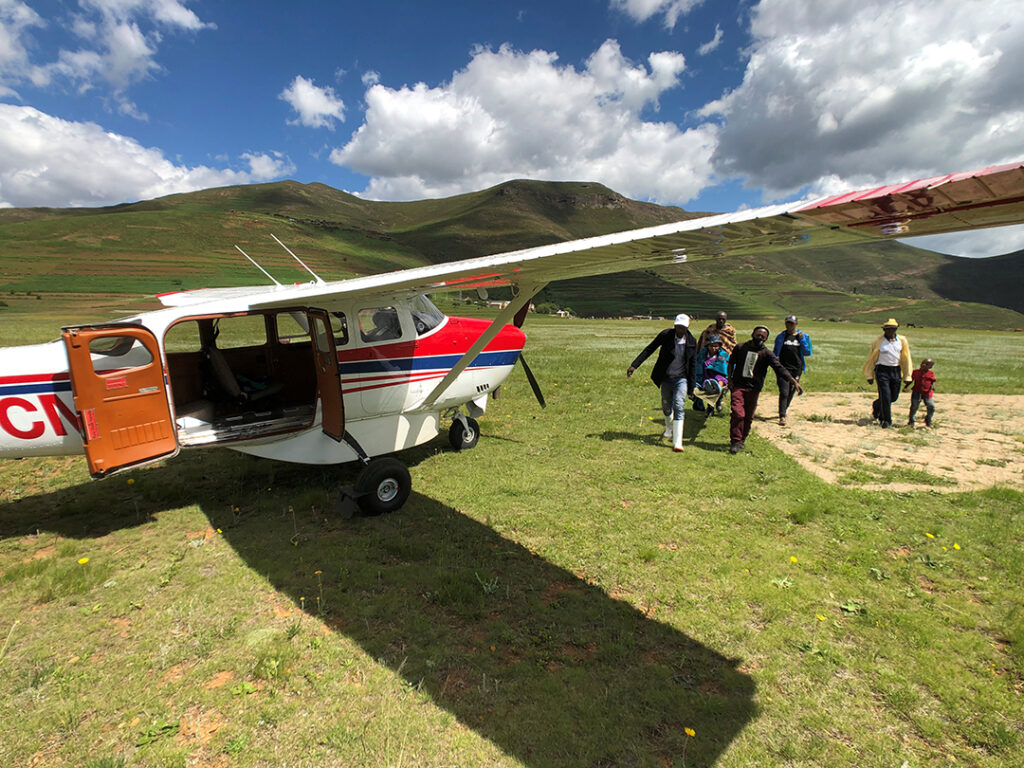ADF STAFF
As he makes the steep descent to the village of Lebakeng in his six-seat Cessna single-engine airplane, pilot Grant Strugnell scans the runway for animals before landing.
The short airstrip, covered in grass, weeds and flowers, is perched on a narrow ridge with mountains rising to the west opposite a sharp drop into a river valley to the east.
There are no easy touchdowns when flying to remote settlements deep in the mountains of the Kingdom of Lesotho, but this mission is essential.
This plane carries lifesaving vaccines that protect against COVID-19.
Strugnell, an easygoing and adept South African who lives in Lesotho’s capital with his wife and young daughter, is one of five pilots who transports the Lesotho Flying Doctor Service (LFDS) to more than 20 dirt airstrips carved into the rugged terrain.
“Each flight, each landing, is rewarding,” the 36-year-old told ADF, “knowing you are reaching the most remote places in the country with vaccines and health care support that save lives.”
Normally, the Flying Doctors provide essential health care to nearly 300,000 people living in the mountains. Villagers depend on the health workers who serve at 10 rural clinics, two health outposts and four district hospitals for about a week at a time.
The pandemic, however, has shifted priorities.
The second wave peaked in January, as more than 5,000 infections were confirmed and the death toll more than tripled. As of June 26, the country has had 11,239 cases and 329 deaths, according to the Africa Centres for Disease Control and Prevention.
Can the disease reach the most remote mountain villages?
“Of course, it will come here, because human beings live here,” Kuebunyani villager Frank Molefi, 77, told British TV channel Sky News in early June.
The terrain is just one logistical challenge in fighting the spread.
“Some places, once the vaccine flights land at the airstrip, require another 45-minute hike to reach the clinic,” Strugnell said. “Those needing the vaccines often walk for hours to reach the clinic from their village.
“So, if we have a day where we delay for weather, we may be costing people an extra day of walking, as they arrive at the clinic and realize we haven’t made it on the planned day.”
The biggest hurdle, however, is getting doses.
“Lesotho has only really been able to vaccinate health care and front-line workers so far,” Strugnell said. “We need a lot more to even start making a dent on the general population.”
Mampho Leleka, an administrative nurse with LFDS, says she is “not comfortable” with the slow pace of the rollout.
“It’s not fair to everyone,” she told Sky News. “We need to roll out vaccination as fast as possible, because this pandemic is killing people.”
Lesotho launched its Flying Doctors in 1980 to help citizens living in scattered villages amid steep ridges and valleys that crisscross the landscape.
The service initiated rural health care programs and regularly brings food, fuel and medicine to areas in distress. LFDS’s visiting health teams include a doctor, a dentist, a pharmacy technician and a public health nurse.
Pilots are on duty seven days a week for scheduled and emergency flights. They are provided by a U.S.-based charity called Mission Aviation Fellowship, which operates 130 aircraft in 30 countries.
Their treacherous work is a calling.
Lesotho is the only country in the world that stands entirely above 1,000 meters in elevation. Aborted landings are common because of strong tailwinds, crosswinds and downdrafts.
“Mountain-based airstrips keep us on our toes,” Strugnell said.
Flattening the COVID-19 curve is exceptionally difficult in one of the most mountainous countries on Earth, but the doctors, nurses and pilots of LFDS are doing just that.
“I cannot sing their praises enough,” Strugnell said. “We have so many nurses we see from Lesotho, but also from Zimbabwe and other African countries, who are so dedicated and who live in the mountain clinics for weeks on end serving the people.
“They are truly heroes and don’t get enough credit.”

